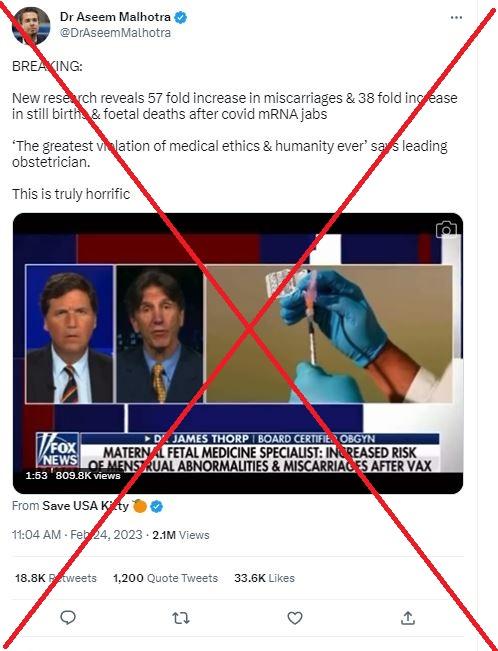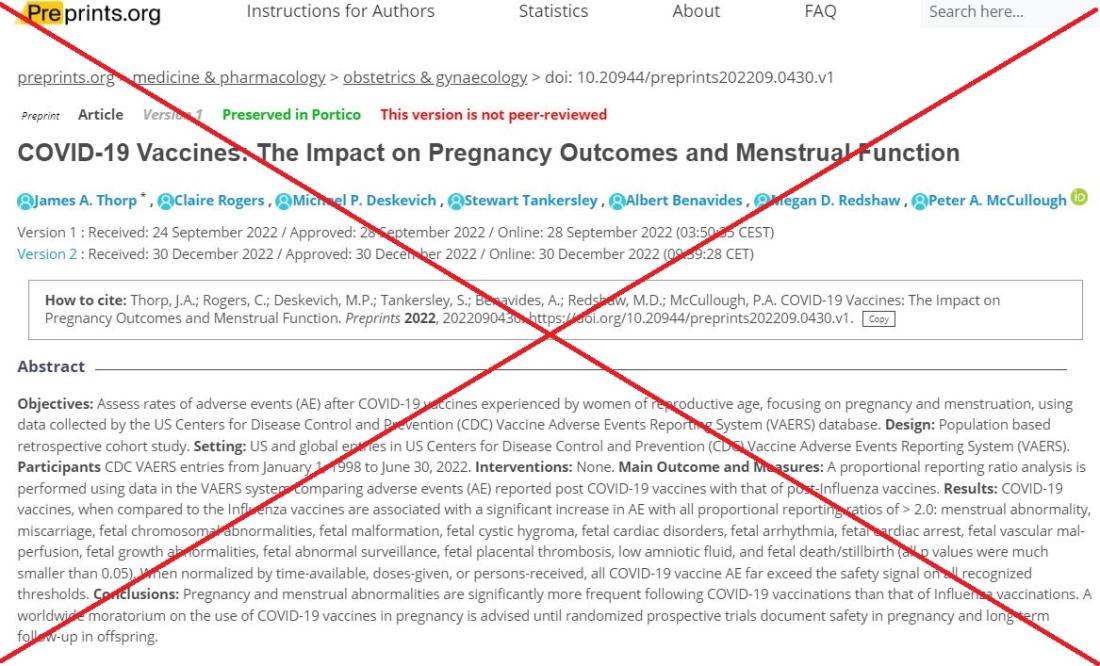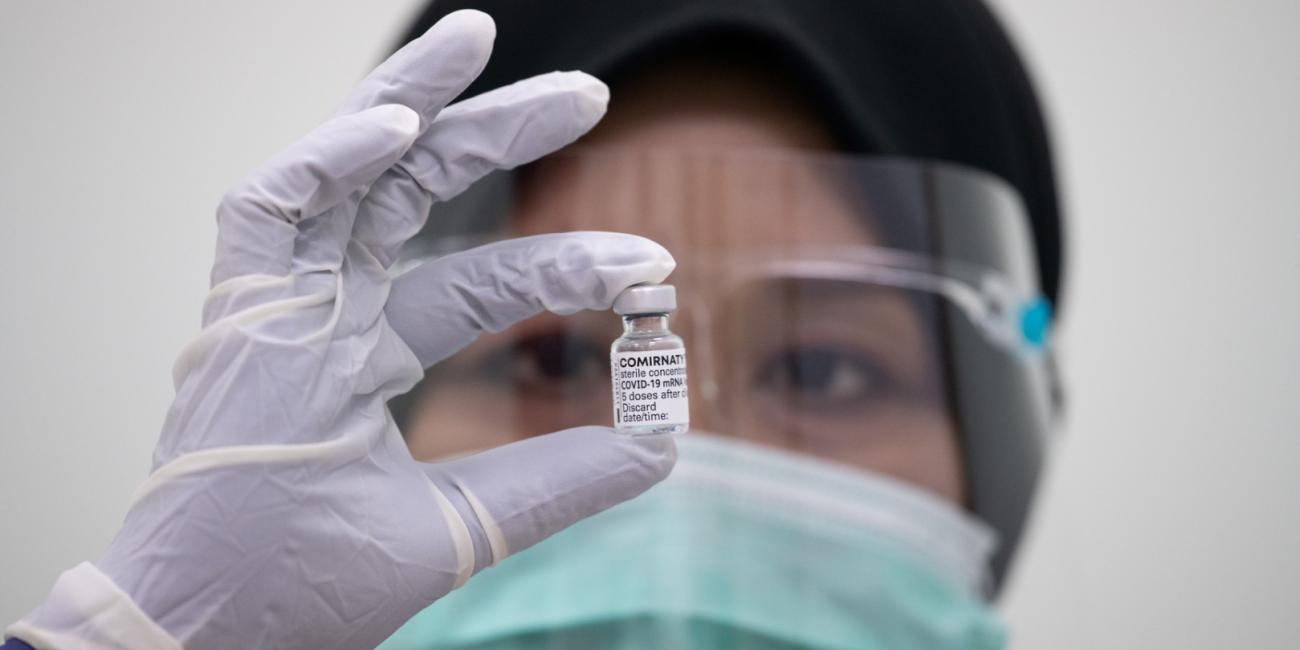
Anti-vaccine advocates falsely link Covid shots to miscarriages
- This article is more than two years old.
- Published on March 8, 2023 at 22:32
- 4 min read
- By Julie PACOREL, AFP France
- Translation and adaptation Rob Lever
"New research reveals 57 fold increase in miscarriages & 38 fold increase in still births & foetal deaths after covid mRNA jabs," said Aseem Malhotra, a UK cardiologist who has previously spread vaccine misinformation, in a February 24, 2023 tweet.
The post includes a clip with more than 810,000 views that features the paper's author, James Thorp, in an interview with Fox News host Tucker Carlson.
"One can make a very strong argument, Tucker, that the pushing of these experimental Covid-19 vaccines globally is the greatest violation of medical ethics in the history of medicine, maybe humanity," Thorp, an American gynecologist who was previously featured in a film full of falsehoods about Covid-19 vaccination, told Carlson on February 23.

Other anti-vaccine advocates, including US cardiologist Peter McCullough, also promoted the claims online.
"Miscarriage, stillbirth, newborn demise have skyrocketed with ill-advised #CovidVaccine in pregnant women," McCullough said in a February 25 tweet linking to the preprint paper, which he co-authored.
The report is based on data from the US Vaccine Adverse Event Reporting System (VAERS), a database that the Centers for Disease Control and Prevention (CDC) and the Food and Drug Administration (FDA) use to unearth potential safety issues with authorized vaccines.
The authors claim they found far higher rates of menstrual abnormality, miscarriage and stillbirth among those who received the Covid-19 vaccine compared to the influenza shot.
Carlson said during his February 23 broadcast that the report "found a 1,200-fold increase in menstrual abnormalities and a 57-fold increase in miscarriages." Thorp agreed, adding that he found "a 38-fold increase in fetal death or stillborn rates."

But health experts told AFP the data cited in the paper misrepresent VAERS, which includes unverified reports of potential adverse effects following vaccination. AFP has previously reported on how vaccine critics misuse the government database to spread misinformation.
"The assumption they make is that any increase in reporting related to Covid vaccination reflects an increase in the miscarriage rate," said Victoria Male, an immunology lecturer and researcher at Imperial College of London. "But this is not necessarily true: it could also reflect an increase in reporting rate."
Male also told AFP in a March 3 email that the claimed spike in the miscarriage rate is "an impossible figure."
"The normal miscarriage rate is around 12 to 18 percent, so a 57-fold increase would mean that 700-1000 percent of pregnancies miscarried, which is clearly not possible," she said.
"Peer-reviewed analyses of the same dataset have found no signal suggesting an increased risk of any pregnancy problems associated with Covid vaccination."
Greater risks from Covid
Researchers say peer-reviewed studies indicate Covid-19 infection presents more risks to pregnant people than vaccination.
"Pregnancy roughly doubles the chance that an unvaccinated individual who catches Covid will need intensive care, and catching Covid in pregnancy increases the risk that your baby will be born preterm (by about 1.5 times) or stillborn (by about 2.4 times)," Male said.
AFP has previously debunked claims that Covid-19 vaccines increase the risk of miscarriage here and here.
Thorp's paper "purports to show an increase in stillbirths in California, based on an anonymous source," Male said -- but she noted the US state's Department of Public Health reported no significant increase in stillbirth rates since the introduction of Covid-19 vaccines.
Health authorities in the United States and elsewhere recommend vaccines during pregnancy, based on the best available evidence.
In France, officials recommend Covid-19 vaccines during all stages of pregnancy.
"At the beginning (of vaccine availability) we recommended avoiding the first trimester," said Joelle Belaisch-Allart, president of the College of French Gynecologists and Obstetricians, in a March 3 email. "Today we recommend vaccination at any time, although it is preferable to be vaccinated before becoming pregnant."
Menstrual cycle
The paper's claims about menstrual abnormalities are also misleading, according to available research.
"Getting vaccinated does increase the chance that your next period will be later-than-usual or heavier-than-usual, but this goes back to normal quite quickly," Male said.
"In unvaccinated groups, about 5 percent of people will have a late (defined as more than a week) period, compared to 6.2 percent in vaccinated groups ... In unvaccinated groups, about 35 percent of people will have a heavier than usual period, compared to about 39 percent in vaccinated groups."
Research from the United States and European Medicines Agency (EMA) also shows small and temporary effects on menstrual cycles. But an EMA report says there is "no evidence to suggest the menstrual disorders experienced by some people have any impact on reproduction and fertility."
All of AFP's reporting on vaccine misinformation is available here.
Copyright © AFP 2017-2026. Any commercial use of this content requires a subscription. Click here to find out more.
Is there content that you would like AFP to fact-check? Get in touch.
Contact us




